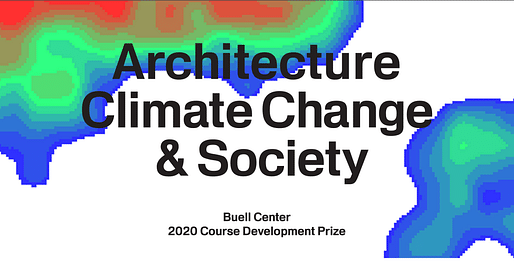anchor
ACSA and Temple Buell Center announce $50,000 in prize money to support climate change coursework

ACSA and the Temple Hoyne Buell Center for the Study of American Architecture at Columbia University have announced the winning entries of the 2020 Course Development Prize in Architecture, Climate Change, and Society. Image courtesy of Buell Center / ASCA.
The Association of Collegiate Schools of Architecture (ACSA) and the Temple Hoyne Buell Center for the Study of American Architecture at Columbia University have announced the winning entries of the 2020 Course Development Prize in Architecture, Climate Change, and Society.
The competition, launched in 2019, aims to bring $50,000 in funding to five university teams that are each tackling a different facet of the climate crisis through cross-disciplinary research that proposes "methods and themes that innovate within their institutional setting" while also "asking hard questions of students that are equal in weight to the hard questions being asked of society as it grapples with the intertwined causes and effects of climate change."
According to the organizers, the prizes seek to find a middle ground between the expansive creative capabilities of design education and the more focused, practical realities of professional practice that sometimes complicate the application of design ideas.
The five winning entries cover a wide scope of study topics, including sea level rise in existing urban neighborhoods, the role of future professionals in climate change discourse, and how decarbonization as design goal can be worked into studio curricula.
Each of the winning course proposals will receive a $10,000 prize spread out over two years to fund the research proposal. The winning proposals will be presented at the ACSA 108th Annual Meeting in San Diego taking place March 12-14, 2020.
The Winners
- Adaptation to Sea Level Rise: Mason Andrews (Hampton University)—This course proposes seeks to extend "a two-semester, cross-disciplinary course focusing on adapting to the impacts of sea level rise in existing urban neighborhoods in sadly soggy southeastern Virginia" by developing "a new community of practice" that will combine design, hydrology, preservation, urban design, pure and social science focuses.
- Public Issues, Climate Justice, and Architecture: Bradford Grant (Howard University)—Students will work to shape and consider the public and professional understandings of the "array of social and political dynamics" that shape "changes in policies for environmental equity" while also proposing new understandings of designers' "role as future professionals in the public process for climate change design policies, environmental justice, and a call for action."
- Unthinking Oil: Public Architecture and the Post-Carbon Imaginary: Gabriel Fuentes, Daniela Shebitz, and Julia Nevarez (Kean University)—A cross-disciplinary educational program will be taught in collaboration with Kean University's School of Public Architecture, School of Environmental and Sustainability Studies, School of Social Sciences, and the Human Rights Institute in an effort to "intersect architecture with the emerging field of energy humanities in order to speculate openly and collectively on the broad political and aesthetic dimensions of climate change."
- Design Based on Estimating Ripple Effects of Carbon Footprint: Jeanne Homer, Khaled Mansy, John Phillips, and Tom Spector (Oklahoma State University)—This group of design educators seeks to integrate design studio curricula with "the climate action goal of decarbonization" by integrating "carbon footprint as the primary measure of performance" in an effort to "open the door for students’ creativity in finding innovative ways to minimize carbon emissions due to both operational and embodied energy."
- Exist, Flourish, Evolve—Territorial Care and the Upper Misi-Ziibi: Gabriel Cuéllar (University of Minnesota)—The course creates a design studio centered around "imagining how architecture, as a discipline, practice, and material reality, can help uphold the Rights of Nature." Among a wide set of considerations, the studio will outline "concrete expressions of the ethics of care embodied in the recognition of rights for other-than-human entities."
Similar articles on Archinect that may interest you...


1 Comment
Ah yes, the Climate Crisis, for those that haven't studied or understood fractal mathematics or climate history dating back more than 100 years.
Block this user
Are you sure you want to block this user and hide all related comments throughout the site?
Archinect
This is your first comment on Archinect. Your comment will be visible once approved.